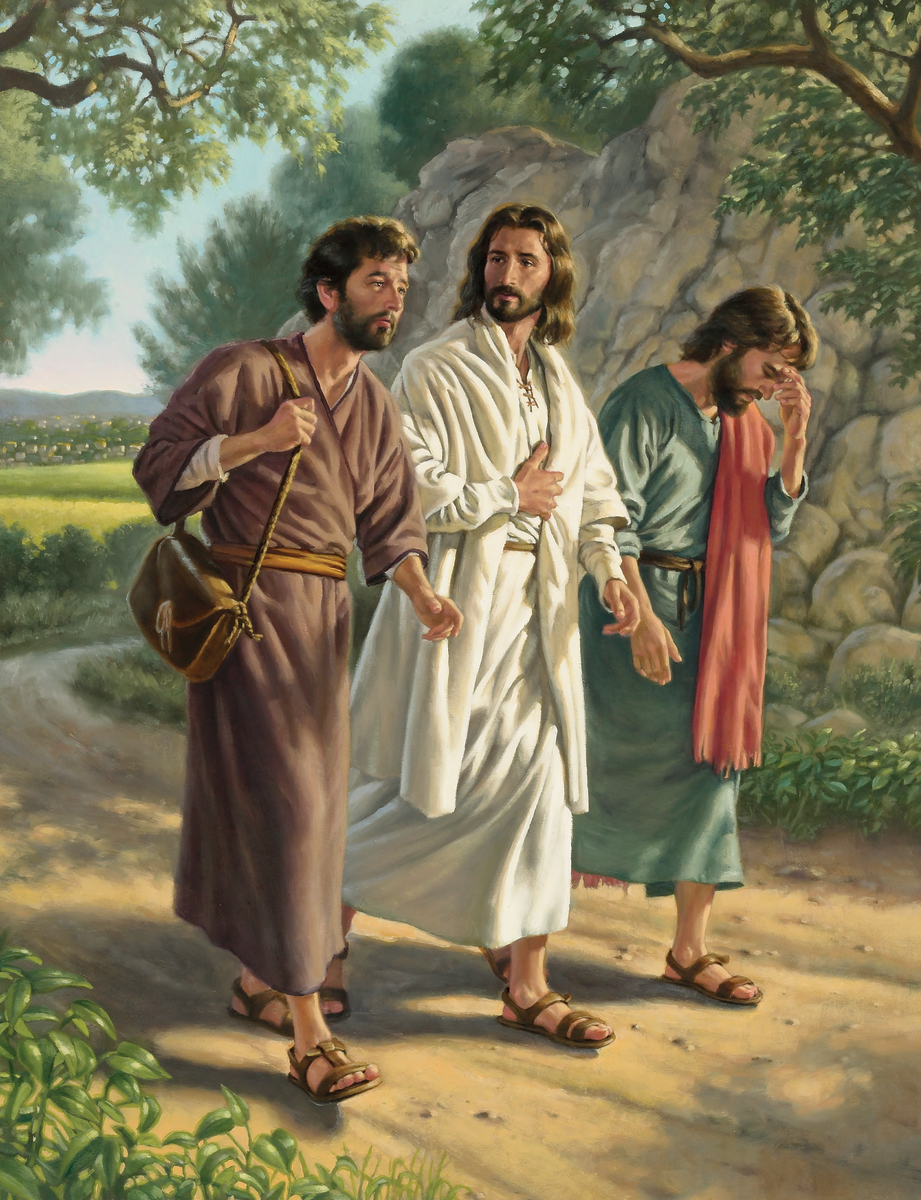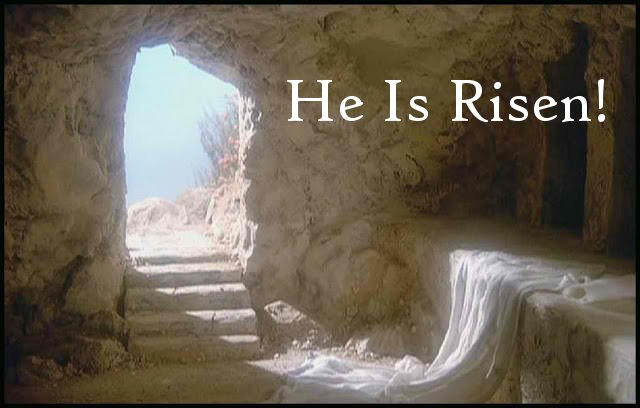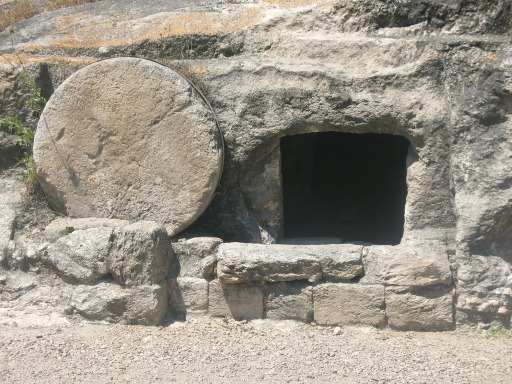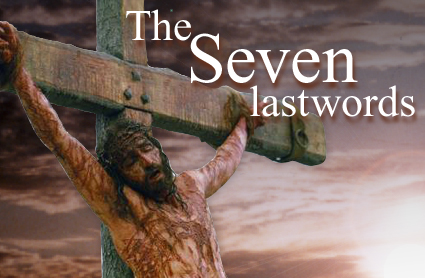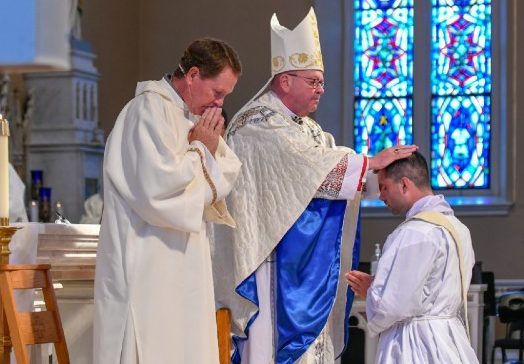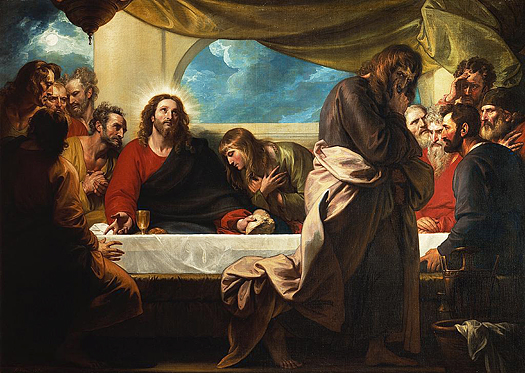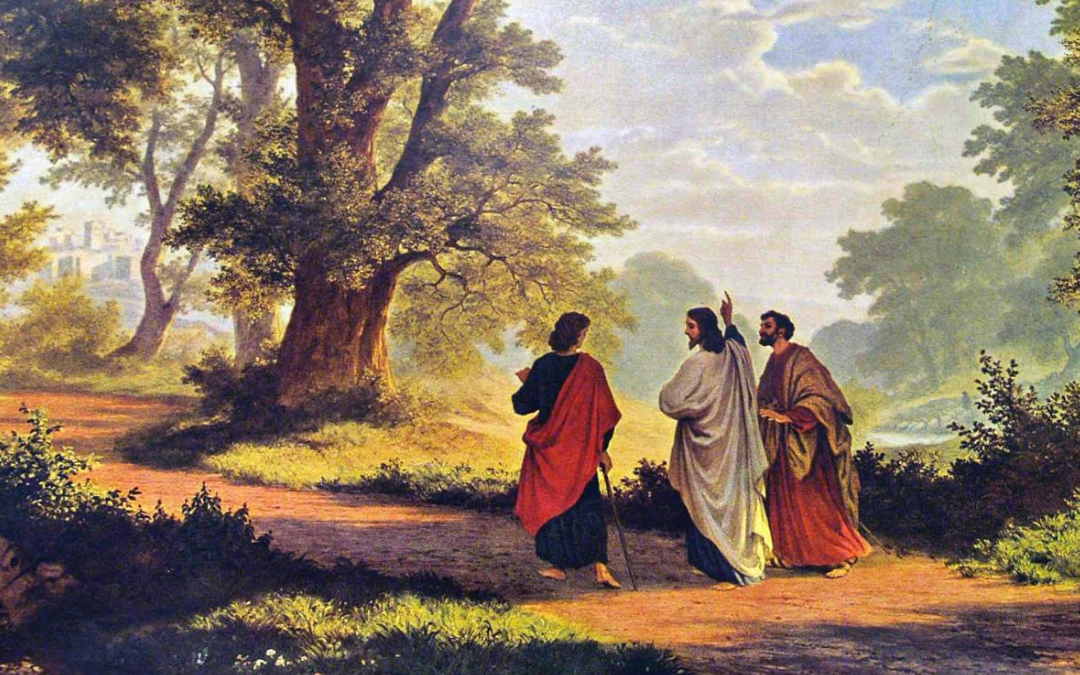
Just as Jesus opened the eyes of the two disciples on the road to Emmaus my hope is that today, your eyes will be opened to Jesus at Mass and that you will recognize Him in the explanation of the scriptures (the Liturgy of the Word) and the breaking of the bread (the Eucharistic prayer).
The first Mass was the Last Supper, when Jesus took bread and wine and changed them into His body and blood. But when was the second Mass? The second Mass was with the two disciples on the road to Emmaus when Our Lord took bread, blessed it, broke it and gave it them and at that moment, the recognized it was the Lord.
Before meeting Jesus on the road, the eyes of the two disciples were downcast as they had hoped for the redemption of Israel. They were disappointed Jesus died on the Cross. However after their encounter with Jesus, they returned to Jerusalem to tell everyone they had seen Him.
Here is an explanation of the Mass. Before Mass we bless our self with holy water to remind us of our baptism and we should pray, “O Jesus, wash away my sins, by your precious blood.” Before being seated we genuflect because we enter into the presence of the King of heaven and earth in the tabernacle.
Mass begins with the Penitential Rite, as we ask for God’s mercy. If we approach the Sacrifice of the Mass in a humble manner, we will all the graces and gifts God wants to give us. When we examine our conscience, we must truly bring them to mind and ask the Lord for forgiveness.
When we sing the Gloria, we are singing the words of the angels at the birth of Jesus, Glory to God in the Highest and peace to His people on earth. The priest then collects all the prayers of the people and offers them to God in the opening prayer called the Collect.
As Jesus explained the scriptures to the two disciples, so the priest explains the scriptures to us at Mass. We stand for the Gospel because we believe Jesus Himself speaks when it’s proclaimed. Our hearts burn within us, when the scriptures are explained during the homily. We must want to hear what God has to say and be willing to do whatever the Lord is asking through the homily as the priest speaks on behalf of Jesus. When we pray the Creed, we are all publicly united together in what we believe. The intercessions help us to pray for the world, our country and our own needs.
The offertory is incredibly important. There is great symbolism in people walking down the aisle with hosts, wine and the collection. What we are supposed to do, is offer our works, our good deeds, our sacrifices, our sufferings, our daily duties and especially give our self to God with the bread and wine given to the priest. Then later during Mass, the priest will offer the bread and wine with all your sacrifices and His to God the Father, through Jesus. That’s why the priest says, “Pray brethren, that my sacrifice and yours will be acceptable to God our almighty Father.”
The Eucharist is the new and everlasting covenant. A covenant is the total giving of one person to the other. Just as the marriage covenant is a total giving of one person to another, so at Mass, we give our self totally to God and God gives Himself totally to us in Holy Communion. The offertory is the moment we are to give our best to God, which is the gift of our self.
We then sing the Holy Holy Holy. We believe by faith that during the Holy Holy Holy, heaven is opened and angels descend from heaven to surround the altar. St. John Chrysostom said, “When Mass is being celebrated, the sanctuary is filled with countless angels who adore the divine victim immolated on the altar.”
The priest then begins the Eucharistic prayer and we invoke the intercession of the saints, asking them to pray for us. We kneel because incredible things begin to happen on the altar and we kneel out of reverence for what God is doing at the altar. We kneel because when the priest prays over the gifts, which is called the epiclesis, the Holy Spirit descends from heaven onto the bread and wine, and sanctifies them. So we should try to visualize the Holy Spirit in the form of a dove descending upon the gifts of bread and wine on the altar.
We kneel at Mass because when the priest utters the words of Jesus at the Last Supper, the re-presentation of Calvary occurs on the altar in an un-bloody manner. Not representation, but re-presentation. Jesus is not re-crucified, but rather that one crucifixion becomes present on the altar, which is why the Church requires every altar to have a crucifix on the altar or near the altar as reminder as to what truly happens on the altar. That’s why the Mass is called the Holy Sacrifice of the Mass.
I like to tell children, the Mass is kind of like a time machine. Instead of us going back 2000 yrs., the crucifixion event is made present to us today.
We are also present at the Last Supper. The bread and wine is really and truly changed into the body and blood of Jesus. It’s really a double miracle. The first miracle is that bread and wine are changed into the body and blood of Jesus and the second miracle is that they continue to take on the appearance of bread and wine, though they have truly substantially changed, which is why we call it transubstantiation. Jesus does not come inside the bread, which is what Protestants believe. No. We believe the bread no longer bread at all and that is why we treat the Eucharist with the greatest reverence possible, as God. This is why we wear modest clothing and dress up for Mass because God is physically present in the Eucharist.
So when you hear the priest say this is my body and when the priest elevates the chalice above the altar, with your mind’s eye see Jesus hanging from the Cross. And when you gaze upon the Eucharist, look beyond the veil of the white Host and see the face of Jesus.
Then when you come forward to receive Holy Communion. As the priest says, “the Body of Christ”, see the risen and resurrected Jesus standing before you. You are not merely receiving a hunk of flesh. The Church says we are receiving the body, blood, soul and divinity of Jesus, which means the whole and entire person of Jesus in the Eucharist.
When we respond saying “Amen”, we are saying “I believe”. Just as Jesus physically walked through the walls and appeared to the Apostles in the upper room, Jesus will walk through the wall of our body and in our heart in Communion.
When we receive Holy Communion, it’s called “communion” because we have “union” with the Lord. He gives Himself to us and we give our self to Him. There is an exchange of love. His heart and our heart beat in unison together as we share our love with each other. We receive spiritual gifts from our union with Jesus to endure pain and sufferings and to carry our crosses.
One of the primary purposes of the Mass is to atone for our sins and the sins of others. Did you know it’s more important to offer Masses for the living, than for the dead? St. Anslem said, “A single Mass offered for oneself during life may be worth more than a thousand celebrated for the same intention after death.”
Do you miss loved ones who have gone before you? Many people will visit the grave of a loved one often because they miss the person who has died. Yet, at the grave is only the body. If the person lived a good life, the soul is either in purgatory or in heaven. And during the Mass, all in heaven, in purgatory and those on earth are mystically together worshiping God around His throne. If you miss your husband or your parents, or any of your relatives—remember that at Mass they are your side worshiping God.
When we sing the Lamb of God, it’s a reminder the Mass is the Passover because Jesus is the unblemished sacrificial lamb we are to eat in Holy Communion. He is the lamb who takes away the sins of the world due to His blood being smeared on the posts of the cross, so that all of us can Passover from death to heaven.
The Methodist Church, the Lutheran Church, the Congregational churches all have, what they call, a communion service. But they would agree with me, they do not have the Holy Sacrifice, there is no re-presentation of Calvary, heaven is not opened, angels and saints are not praying with them at their service. They believe Jesus comes inside the bread, but leaves after their service is over. That is why they don’t have tabernacles. They do not have apostolic succession, because they don’t have the laying on the hands from bishops to priests for over 2000 years like the Catholic Church. The truth is, they say the words of Jesus at the Last Supper, but nothing happens.
The Mass is the holiest and most sacred event that happens on the face of the earth. That is why out of reverence, we bow, genuflect, and kneel during Mass. We give our reverence by dressing up for Mass, by wearing our Sunday best. We shouldn’t wear shorts to Mass or when we come to Eucharistic Adoration. I realize its not as cool, as we would like it, but our ancestors for over 1,900 years did not have conditioning, and they dressed up for Mass. We can make a little sacrifice, to show Jesus we love and respect His true presence.
Because Jesus, who is God, is in the tabernacle, the church itself should be a place of silence. I visited with pastor Kenton Abbot from the Lutheran church in Lyons. When I came to see him, his weekday service was going on, and the lady who met me, said, “Shhh, we shouldn’t talk now.” I was amazed they have altar rails and the people come up and kneel at their altar rail and receive communion on the tongue. And yet, they don’t believe what we believe. They don’t have the real physical presence of Jesus in the Eucharist, as we do.
We know the Catholic Church is the one true Church founded by Christ because it has four marks none of the other churches have. We are One, Holy, Catholic and Apostolic. Should we not have a fire burning in our heart to help our non-Catholic friends to discover the truth? Don’t we want them to be able to be at such a holy event, as the Mass, to really receive Jesus in Holy Communion. We need to evangelize them by sharing with them the truth. There are booklets in the back of the church. When you leave take 2 or 3 of them and give them to fallen away Catholics, and to non-Catholics.
So now, at this Mass, and every Mass you attend in the future. Open your eyes to the spiritual reality of what happens during Mass. Allow your heart to be burning within you, when the scriptures are proclaimed and the homily is given. Give yourself to God with the bread and wine during the offertory. See the Holy Spirit come down upon the gifts. See the myriads of angels who come to gather around the altar to worship Jesus on the altar. See heaven opened as we adore the Blessed Trinity with the angels and saints and all our loved ones who have gone before us. At the consecration, see Our Lord hanging from the Cross above the altar. See the face of Jesus in the Eucharist. See the risen Jesus come inside your heart in Holy Communion. Then thank Jesus, pray to Jesus and ask Our Lord for all the graces and gifts you need and pray for the needs of others. Holy Communion is the greatest of all gifts because it is the gift of Jesus Himself. And then when Mass is don’t be afraid to tell everyone you had an encounter with the Lord. You heard His words at Mass as He explained the scriptures to you. You saw Him hanging from the Cross and seen His face in the Eucharist and now you desire to tell everyone He is risen and He loves us and wants us to come to Him often at Holy Mass and receive Him in Holy Communion.
And may the Virgin Mary, help us to be witnesses to the truth, to help everyone to come to know and love the truth, who is Jesus, the way, the truth and the life.





